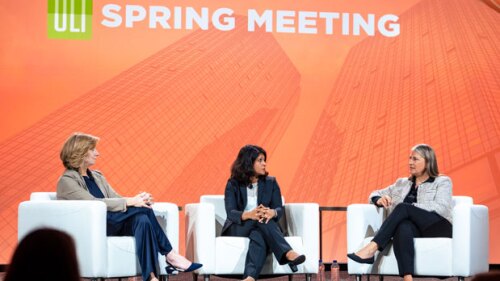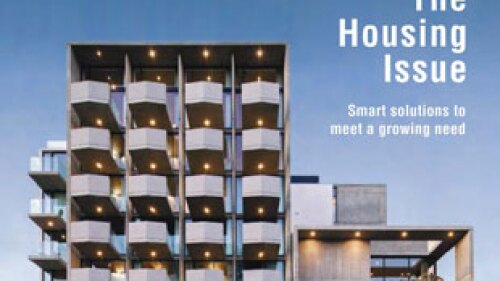| Brad DeLong |
The housing market will recover, but we just don’t know when, says Brad DeLong at the ULI 2011 Spring Council Forum in Phoenix, Arizona. Mr. DeLong is a prolific blogger on macroeconomics and economic policy, Professor of International Economics at UC Berkley and Clinton-administration Treasury Department Deputy Assistant Secretary for Economic Policy. Mr. DeLong says that while the current, anemic housing market can be attributed to real causes, it is part of the normal business cycle and other factors.
United States economic history includes many business cycles and Mr. DeLong asserts that this recession is part of one, although the current recession is the worst since 1929 and continues to surprise everyone with its duration and severity. Many economists and investors were wrong in believing that, in recent years, federal policy and institutions “tamed” business cycles into “minor annoyances,” says Mr. DeLong, adding, “we’ve declared that we’ve had business cycles licked since 1825” and only four years ago “it looked like there would never be a time when machines were idle, and people would never be unemployed.” To prove his point, Mr. DeLong pointed out that in the 1960’s the Business Cycle Digest changed its name to the Business Conditions Digest believing business cycles were a thing of the past.
Factors that fueled the real estate “bubble” are well documented and include entities and nations looking for safe harbor investments, low currency values and high exports and domestic employment, and institutions buying debt that looked stable as a package but had many risky individual components. While Mr. DeLong recognizes that there were warnings about these trends, he stated they went largely ignored.
Furthermore, and because housing was primarily viewed as an investment vehicle, DeLong says Federal Reserve Chairman Greenspan (1987-2006) philosophically believed that it would be bad for consumers and institutions if the Government tried to stop them from making bad investment decisions about their own money. Federal policy-makers grappled with the question of who was getting hurt by zero dollar down and a pick-your-rate mortgages (e.g., individuals paying below market rents with a call option on the house should it appreciate). DeLong described the logic at the time as, “if the anticipated appreciation doesn’t occur the investor/homeowner experienced a loss of unexpected profit. No harm was perceived because the investor lived in the house at an artificially low rent for 3 years.” Intervention was viewed as a lose-lose situation by policy makers concerned that their actions would be negatively viewed by homebuyers and the lending industry.
Other components that caught regulators unaware and resulted in unexpected consequences included new investment vehicles that were created to move capital through the system because the old framework for lending didn’t make sense. When concerns about these vehicles arose, they were dismissed because the subprime market was viewed as a small component of the global economy and past experience led to a mistaken belief that any mistakes could be remedied. Pointing to the 2001 dot-com bust, Mr. DeLong stated that investor and government experience led to the belief that government and institutions could fix mistakes after the fact without suffering from high unemployment and a deep recession.
How to recover? Sadly, says Mr. DeLong, there are few, if any signs that the economy is getting better. He does not hold much hope out for government actions, pointing to dysfunction in Washington, in part due to fears of inflation (even though Mr. DeLong points out that the only places inflation is evident is energy and food), additional public funds crowding out private investment and worries about a fiscal policy that will create deficits that we can’t ever pay back.
However, all is not lost and there is a light at the end of the tunnel. Mr. DeLong believes there is proof of equilibrium-restoring forces in the world economy that will take a long time to realize and that will propel us towards a new normal. “We’re not going to get back to the 62 to 68 percent of the adult population that had jobs,” he cautions.
Pointing to a below-trend construction spending four times larger than above-trend spending during the housing boom, Mr. DeLong says that at some point, housing will recover. He points to immigration as a key element of future demand (and cites statistics that the US is adding 1.5 million people every year), as well as pent-up demand from “people living with their in-laws.” He also says the new demand will force the market to reallocate resources. Noting that people want to live in urban areas and climate change will affect where people will live over the next fifty years, Mr. DeLong said, “We built a lot of houses in the swamps of Florida and in the desert between Albuquerque and Los Angles.” Other factors leading to new demand cited by Mr. DeLong are the growing preference for infill (“if you think you’re going to continue to be able to fill the tank of your Prius for $60.00, you’re wrong” he claims) and climate change.
Read Brad DeLong’s entire presentation, “Economic Outlook for 2011: Yes, It’s Dismal Science, Why Do You Ask?”




